I am a bibliophile and not ashamed to admit it! I love good books, and as much as I read online, paper and ink remain sacred to me. My love for books is thanks to my father’s great library of classics.
I went to the Los Angeles Central Library looking for some books and I couldn’t resist taking these pictures and sharing them with you. This library burnt in 1986—something about burning books fills me up with utter sadness and an enormous sense of loss (remember Fahrenheit 451?)
To see the most beautiful libraries of the world visit this site. We need these in a world where “print” increasingly resembles an endangered species.
The books that were somewhat burnt yet still salvageable are so fragile that they have to be kept in special boxes. You can still see the black soot on them:
You can’t check out the more damaged ones because of their fragility like this one:
The good news is that there are thousands of wonderful and “healthy” books in this library and the reading rooms are very pleasant.
This is one book I have promised myself to read one day:
But who has the courage to even contemplate these ones:
André Kertész‘s newly reissued photo essay “On Reading“, features 66 images, taken between 1915 and 1970, of people enraptured by print.
“Kertész’s images celebrate the power and pleasure of this solitary activity and capture the deeply personal, yet universal moment of reading. This poetic book that has long been out of print is even more compelling today in a world where “print” increasingly resembles an endangered species.”
Even if Jeff Gomez argues that we are at a Gutenbergian moment, in which writers, publishers and readers must make the jump from paper to the more fluid territory of the screen, I can’t imagine being without the smell and the feel of paper.
I still print everything serious that I want to read because staring at my screen bothers my eyes.
“Books won’t stay banned. They won’t burn. Ideas won’t go to jail. In the long run of history, the censor and the inquisitor have always lost. The only sure weapon against bad ideas is better ideas.” Alfred Whitney
Speaking of great photographers, I went to Melvin Sokolsky’s opening night last thursday at Fahey/Klein Gallery. I’ve had the privilege of taking a “Master Class” at UCLA with him some years ago. His pictures have remained as fresh as the day he took them and unbruised by time.

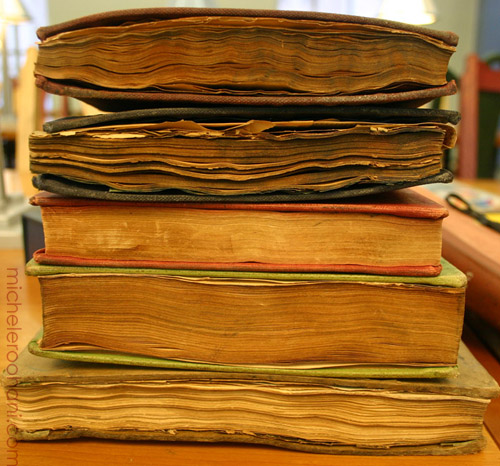

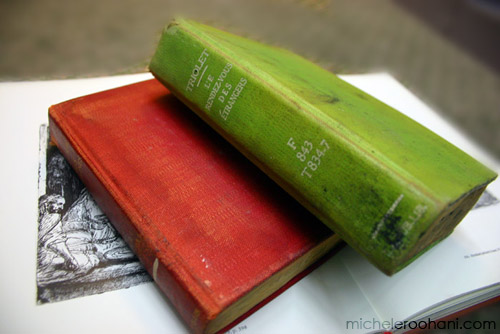
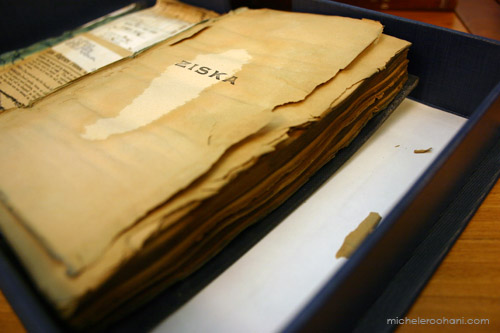
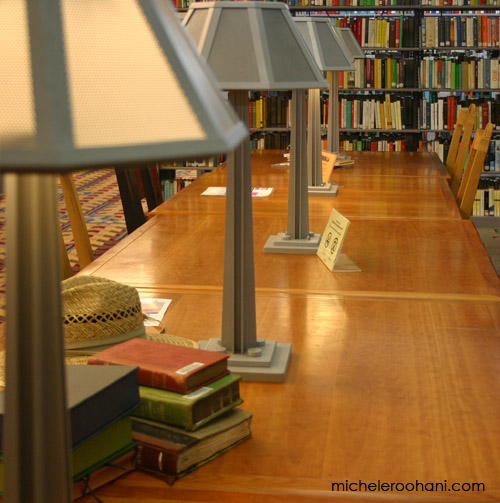
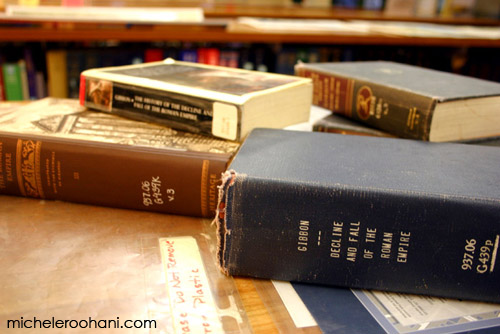
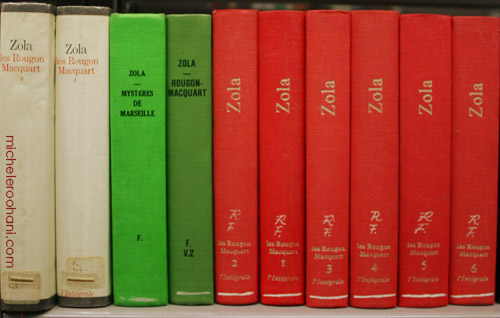
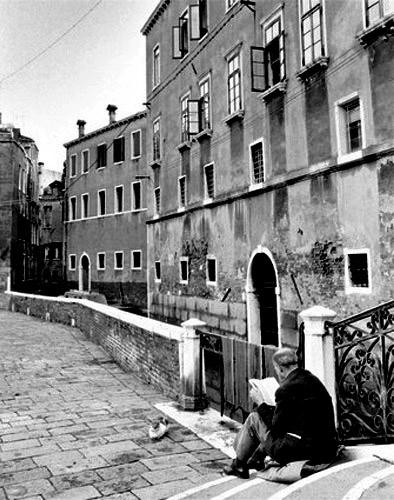
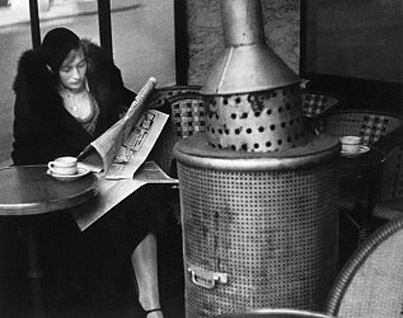
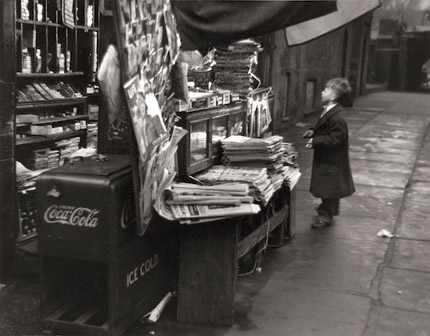
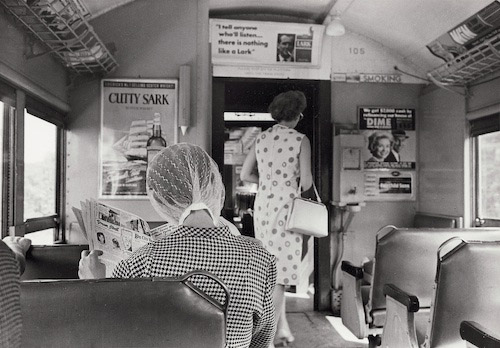
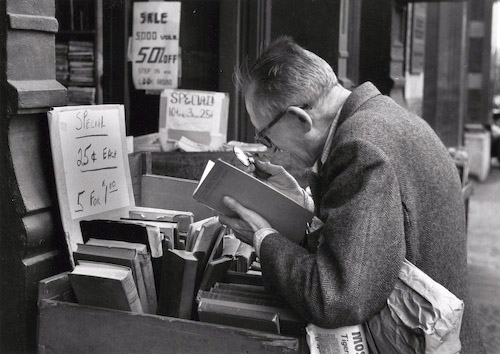
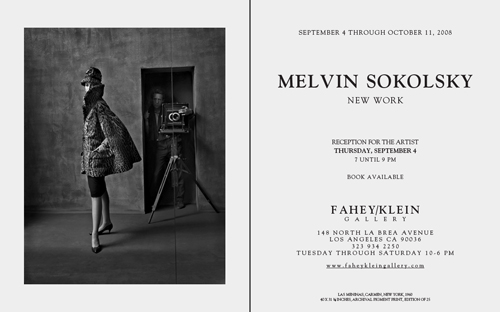
On one of the book there is Ziska, the Czech peasant leader during the Reformation. The Battle of the White Mountain. A book on Ziska in the L.A. Library – true internationalism. Congratulations Michele.
Wow !! Michele
Awe-inspiring post & pictures, we are yet to recover from hangover of earlier post & its consequential debate,and yet another spell of intoxication
There is no frigate like book
To take us lands away,
Nor any coursers like a page
of prancing poetry.
This traverse may the poorest take
Without oppress of toll;
How frugal is the chariot
That bears the human soul !
Emily-Dickinson
میشل عزیز .چه عکس هایی .عالی هستند عالی .انگار عکس های سیاه و سفید دارند داستان تعریف می کنند .مرسی از این پستت .
Great post. Although a library is functionally like a huge brain comprised of many different ideas, or books, I can’t help but feel claustrophobic lately whenever I visit one (or even a big book store!) I don’t mean like real claustrophobia but just a feeling of unease over the overwhelming amount of info before my eyes and my ignorance of 99% of it! In cyberspace, at least, this information is hidden somewhere in a million different hard drives scattered across the globe; but in the library, it’s so in your face you can’t deny it! It makes you feel like you’re running out of time and will never know anything in this world!
I must say that I envy your love of books. As I’ve gone older, after 30, I realized that I can’t get myself to sit down and read books any more! I don’t know if this is something shared by anyone else here but I think the speed of life has increased so much that at least for me, I’ve lost the ability to just sit down and read a book! Definitely no novels… movies are much more efficient of course! Obviously, I know what I’m missing and am not happy about it; but I’ve ran into a lot of people lately with a similar experience. In the information superhighway, where all is at your fingertips, the lost art of patience will be tomorrow’s challenge. I wonder how the next generation will deal with it. Will books go the way of the abacus, obsolete and redundant, when only the essence of information will count without embroidery, or will they be as popular as now or even more? I don’t know; but I can see that the side effects of a faster pace society is the inability to sit down, relax, and read longer than 10 minutes.
I ran into a Harvard astrophysics professor here who told me he would rather think than read! I thought it was pretty interesting! 🙂
After all, all this analysis should lead into some synthesis. Or at least, we hope!
This made me think of the satirical songwriter Tom Lehrer, who was never well-known, but sang from the late 1940s to the early 1970s. His greatest exposure came as a writer for the celebrated comedy news show, “That was the Week that Was”, known as TW3, where songs like “Pollution” and “The Vatican Rag” aired.
The song this recalled to me is called “Smut”. There is a verbal intro on the album, and the lyrics:
“I do have a cause though. It is obscenity. I’m for it. Unfortunately the civil liberties types who are fighting this issue have to fight it owing to the nature of the laws as a matter of freedom of speech and stifling of free expression and so on but we know what’s really involved: dirty books are fun. That’s all there is to it. But you can’t get up in a court and say that I suppose. It’s simply a matter of freedom of pleasure, a right which is not guaranteed by the Constitution unfortunately. Anyway, since people seem to be marching for their causes these days I have here a march for mine. It’s called…
Smut!
Give me smut and nothing but!
A dirty novel I can’t shut,
If it’s uncut,
and unsubt- le.
I’ve never quibbled
If it was ribald,
I would devour where others merely nibbled.
As the judge remarked the day that he
acquitted my Aunt Hortense,
“To be smut
It must be ut-
Terly without redeeming social importance.”
Por-
Nographic pictures I adore.
Indecent magazines galore,
I like them more
If they’re hard core.
(Bring on the obscene movies, murals, postcards, neckties,
samplers, stained-glass windows, tattoos, anything!
More, more, I’m still not satisfied!)
Stories of tortures
Used by debauchers,
Lurid, licentious, and vile,
Make me smile.
Novels that pander
To my taste for candor
Give me a pleasure sublime.
(Let’s face it, I love slime.)
All books can be indecent books
Though recent books are bolder,
For filth (I’m glad to say) is in
the mind of the beholder.
When correctly viewed,
Everything is lewd.
(I could tell you things about Peter Pan,
And the Wizard of Oz, there’s a dirty old man!)
I thrill
To any book like Fanny Hill,
And I suppose I always will,
If it is swill
And really fil
thy.
Who needs a hobby like tennis or philately?
I’ve got a hobby: rereading Lady Chatterley.
But now they’re trying to take it all
away from us unless
We take a stand, and hand in hand
we fight for freedom of the press.
In other words,
Smut! (I love it)
Ah, the adventures of a slut.
Oh, I’m a market they can’t glut,
I don’t know what
Compares with smut.
Hip hip hooray!
Let’s hear it for the Supreme Court!
Don’t let them take it away!”
copyright Tom Lehrer
Your work and taste are so…
, I’m looking for right words since words are so feeble here, …
aha I found it,
UNIMAGINABLE!!!!!
Does this word mean better than great?
I am entirely able to identify and relate to Ali ‘s feelings, as I face similar uneasy sensations,whilst visiting Mega Book shops, Library and great Museums, it’s a mixed emotion, of feeling overwhelmed, vulnerable & numb.
To an extend I, attribute these to an actuality that at these spaces, paradoxical forces of our Apollonian and Dionysian nature merges, which possibly creates this quivering
I also concur that in this hyper active & connected world our attention spans are getting shorter and society at large is suffering from ADHD.. And our capacity to read and sustain a classic work of literature has considerably declined. In fact this has profoundly affected our psyche..
In spite of our hyper connectivity, we are feeling more lonely, empty and devoid of human connections, hence seek refuge on facebook & social networking sites, which are cyber equivalent of reality shows. Book shops are crammed with so called self help & spirituality books, which I reckon are best sellers; signs of deeper maladies
Dear Michelle
THey are some of the most heart warming images i have seen in a long time. The ones taken by yourself and even the ones in Noir et Blanc.
Its the gaze with an inquisition which is intriguing in the Noir et Blanc.
Thank you for warming our hearts. Its feels like a great cup of cappucino four the soul and mind.
Dear Michelle
Ajay , has put a befiting poem to your current blog.
THanks LAo Aju, for sharing this poem with us.
Nimesh
thank you for your warm comments – i understand our shared pain of trees getting killed for bad books, the effort spent on printing horribly useless stories and the alarming un-curious (an adjective created for Bush) state of the youth.
i sent this article http://www.theatlantic.com/doc/200807/google to my friends some time ago about the anxiety of “too much of too many things in too many places”. i am torn between being in love with the internet—which puts every library in the world at my fingertips—and the demise of my beloved PRINT/PAPER/INK…
a book stays beautifully tactile and reminds us of the good old quiet days when people didn’t have to hurry in everything even in LOVE!
my focused mind is being torn apart by too much information (too much bad information).
call me a romantic but i still print my online articles every night on “recycled paper” and save my eyes from the brutal glare of my omnipresent/omniscient/omnipotent computer screen.
I’m proud to be your friend, my dear Michele.
Il me vient à l’esprit cette phrase lue sur un mur de Turin : “Lire, c’est vivre”!
Great art. Reflecting a contemporary trend in human civilization. Made me think of the Alexandria Library of papyrus books which was burned down by a Roman soldier.
Indeed the books and literature are shifting from print to the screen, but the human being is not ready for such a shift. Lewis Mumford and Jose Ortega y Gasset were among the first warners of the dangers of technology. Not to forget the Koran, which said 1200 years ago, “The west will soon find out what a catastrophe it has created with its industry.”
Askin Ozcan
Author
Admirer ces photos de vieux livres est émouvant. Merci Michèle de nous faire rêver de la sorte.
Ces livres qui contiennent à l’intérieur de leurs antres, les choses de la vie, la richesse du ciel, conservée dans le silence de leurs pages, et qu’on ose à peine les déranger, de crainte que leurs mots ne s’envolent, et disparaissent dans l’infini. On les consulte avec d’infinies précautions, comme étant de rares legs d’un passé qui graduellement cesse de nous appartenir.
Ils craignent le soleil, et se rassurent de l’obscurité. Ils aiment l’intimité des lueurs des bougies de cire.
Il leur appartient le privilège de sauvegarder le savoir pour le transmettre a ceux qui désirent s’en abreuver.
Leurs pages jaunissent et leurs couvertures craquellent, mais leurs mots gardent a jamais leur intensité sans en être altéré.
Cette mémoire des hommes, serrée sur des pages réunis ensembles comme une famille, sont les tenants de la protection de ces hiéroglyphes du savoir.
Dear Michele,
Your pictures tell a book but the books tell nothing.
For, life cannot be written. It must be lived. The pictures live a life.
Once life is written it is called book and hence book is not the life.
It is a definition of life, an aspect of it, solidified and framed by the pen or mind or wisdom of the author. Therefore many books not worth reading.
Authors are authors for they have a book and books are read merely for they are books
and must be read. This is the mentality of many book readers.
If an author would pulsate with life, hence with universe, its book may worth reading for it is probably alive. And when a book moves you to live then it carries the flow of life. Words of life are called word or words.
So neither listen to me nor listen to a book. Just listen to the word.
Neither read me nor read a book. Read the word. How you get there? It is a long way to go.
Merci.
J’aime beaucoup cette phrase d’Abner : “ils craignent le soleil et se rassurent de l’obscurité”…J’ajoute que c’est sans doute parce que les livres ont en eux suffisamment de lumière pour ne pas redouter la pénombre.
Entropy, I’m glad at least you agreed with me on this overwhelming feeling when visiting a large library or bookstore. I was wondering if I should see someone about it as the feeling was beginning to appear uniquely and abnormally mine! 🙂
You mentioned that the society has suffered for not being able to sit down and read a classical work. I don’t know about that. Clearly, technology and innovation is constantly changing our tastes and meaning in this world. If we can’t sit down and read Crime and Punishment, then maybe we can sit down and play Grand Theft Auto IV! Equal exchange?!!! I guess not. But all depends on what tomorrows’ needs and required skills are. The society always maneuvers and adapts to its changing needs. So, if our senses are shaped as a byproduct of the world we live in, maybe the generations to come will be better off not reading and memorizing, but instead, learning to access information and downloading it at a moment’s need! That seems to be the current trend anyway. Who knows.
“…Mais sans les livres, il se pourrait bien cependant que tout nous échappe : le monde physique, même si je le parcours, parce que je n’aurai rien appris; le monde humain, l’histoire, parce que je n’en saurai rien; les langues – y compris celle de ma naissance, parce que je ne les parlerai pas ou les parlerai mal; les oeuvres, les paysages, la douceur des soirs sur des bords étrangers, parce que je n’en aurai pas retraversé l’expérience dans le miroir des livres […]Lire, c’est s’accorder à la splendeur du monde.”
Danièle SALLENAVE “Le don des morts (Essai sur la littérature)” Editions Gallimard 1991
OK, guys. I think we’re all bibliophiles here. But I can’t resiste the urge to be the devil’s advocate . . .
I’m really looking forward to the day when everybody can have their Digital Reader. It will have all the qualities of books. The pages will be just as readable as the paper we all know and love. The Reader will be intuitive and easy to use. And best of all you will be able curl up in bed with it!
But once perfected, the Reader will be able to do so much more. We’ll be able to zoom in and make the print the exact size we want. When there’s a word we don’t understand, the Reader will make it easy to look up the definition. Of course we’ll have instantaneous access to everything ever written. And what we read will be the latest edition. But if we so wish we will be able to see what changes the author has made. Texts will become non-linear, like they are on the web. In fact, in the future books will probably completely meld into the web.
Just imagine being able to annotate the digital text you’re reading, sharing it with your friends, and also seeing what they thought about the same passage. All in real-time of course!
Our good old paper books will be retired to museums and future generations will look at them with the same interest we do when we see a horse drawn carriage.
I love books. But I love words and ideas even more. I love their souls and will be happy to seem them liberated from their physical envelope.
Of course the elephant in the room of our digital future is Copyright. Can authors be rewarded for their work without making everything very difficult for their readers (the flesh and blood kind)?
Friends,
Let us not rationalise our utter helplessness with e-media’s assault on our sensibility and our inability to keep sanity intact. Also, let us not confuse between information. knowledge and wisdom. My concern is about lack of depth and resonance.
Let me quote a passage from ‘The Gutenberg Elegies’ by Sven Birkets
“In our culture, access is not a problem, but proliferation is. And the reading act is necessarily different than it was in its earliest days, Awed and intimidated by the availability of texts, faced with the all but impossible task of discriminating among them, the reader tends to move across surfaces, skimming, hastening from one site to the next without allowing the words to resonate inwardly. The inscription is light but it covers vast territories: quantity is elevated over quality. The possibility of maximum focus is undercut by the awareness of the unread texts that await, The result is that we know countless more “bits” of information, both important and trivial, than our ancestors. We know them without a stable sense of context, for where the field is that vast all schemes must be seen as provisional. We depend far less on memory; that faculty has all but atrophied from lack of use.”
Michelle, please consider publishing pictures #1 and #5 on art.com/Red Bubble and let me have the privilege of placing the first order.
When I was in the 6th grade, we had a debate on electronic media v/s books. I spoke for books.
Today however, I think I am more inclined to support electronic version. Modern e-readers like Kindle don’t strain your eyes. Moreover, a scenario as described as JL appears to me as bibiophilic paradise.
I don’t deny that books are charming. To quote Terry Glaspey
‘A book has physical reality. It has history. When I hold a book in my hands, I hold memories. I can pluck a book off my shelf and cradle it in my hands while I remember the circumstances of my life during the time I first read it.’
But then, charm is ephemeral. Would you prefer to live under candlelight, just because it’s more charming?
I think it’s an instance of clinging to what we are accustomed to and harbouring prejudice toward anything that attempts to displace it.
Also, this discussion is rather ironical considering a case for books is being made on the brainchild of electronic media- a blog.
Well said Anne!
Although I’ve had a Kindle for a while and downloaded a bunch of books on it the moment it arrived, I can’t seem to keep track of the information I read and learn on it as easily as I can with a physical book. It may be just habit but I also tried the electronic newspaper on Kindle with no luck. As convenient as it was to have the paper beamed to my bed stand by the time I woke up every morning I had to go back to the old home delivery. I did this because the big picture view of a large newspaper page was more conducive to a visual person like myself, compared to a bunch of links on a small screen. It also took me significantly longer time to get through the paper electronically than in page, where I could speed read and capture more information with one glance of a large page. So, although the electronic version was more convenient, the hard copy was better at fast and effective reading of the newspaper.
Of course, we can say that if a book is nothing more than a bunch of information, then how we acquire this information should be irrelevant. I’m a big fan of efficiency; so if digital is more efficient in information acquisition and is also more effective in learning and retaining this information, then the romantic idea of a book is not enough. But if it’s efficient but ineffective in comparison to its material counterpart, then hard copy will trump digital every time. So I guess, it also dependents on the reader and that’s why the hard copy market will not disappear in the foreseeable future. But I do believe that it will be all digital down the line, whether we want it or not. The next generation’s early exposure to electronic books will help them feel more comfortable with that media and books will eventually go the way of the carrier pigeons! That’ll be good for the trees.
I wonder, however, if future intellectuals will have to live incognito with no physical libraries in their homes showing their worldly interests or hobbies. These folks will probably have no bookshelves but drawer replete with tiny flash cards storing thousands of e-books, encyclopedias, internet web-page clippings, and who knows, maybe even a complete digital copy of their own genome! These drawers may sit closely to computer hard drives that store Leo Tolstoy and porn in uncomfortable proximity. The future will definitely be weird!
Anne
Bravo. Though i do not support your point of view completely, but i prefer the middle path, I would want both to exist. Both will exist. I think reading a passage from perhaps “Shakespeare’s quotes” on the e media, might prompt or rather tempt me to go buy the book.
Very intersting quote by Terry Glaspey.
Nimesh
I don’t think future intellectuals will live in bare uninteresting apartments. It’s likely that they’ll have some kind of customizable digital wall randomly displaying family pictures, book covers, internet clippings, blog posts, art, to-do lists, favourite quotes blah blah..
I haven’t had a personal experience with Kindle, but I’m sure that the future will yield better e-readers targeted to woo all us bibliophiles and intuition tells me our resistance is going to collapse rapidly. We may want to remain ‘purists’ and I am sure to gaze guiltily at the reprimanding books in my bookshelf, but as I said, it’s going to be ephemeral.
You are a great artist Michele Roohani!
One of the duties of art is to connect us to our past, as well as to our future, in a beautiful way. You are doing this very well.
Askin Ozcan
Author of:
WISDOM IN SMILE, THE SECOND VENICE, SMALL MIRACLES, STOCKHOLM STORIES, THE MINI-SUBMARINE, LIGHTNING AND A BOUQUET OF ROSES